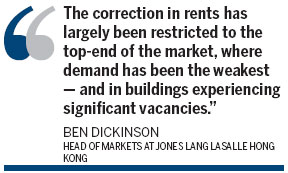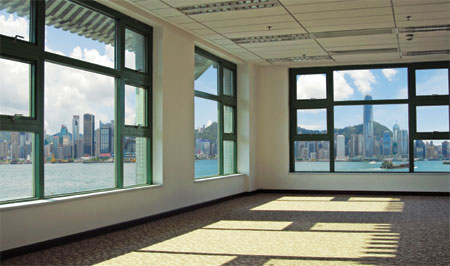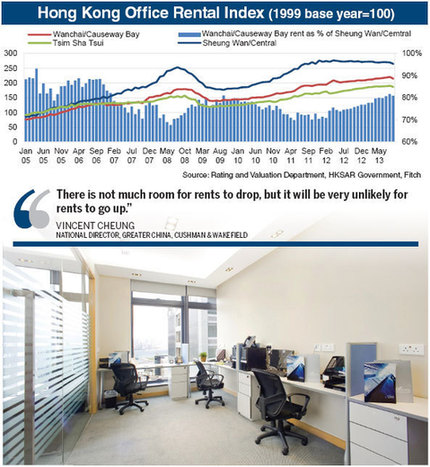Looking for a new lease on life
Updated: 2013-12-13 06:42
By Sophie He(HK Edition)
|
|||||||||
Hong Kong Central is staring at a potential glut of office space, a direct consequence of shrinkage in the city's banking sector, coming at a time when Hong Kong's prime competitors are rapidly expanding. Sophie He reports.
Vacancies have been climbing and rents declining in prime commercial districts, in Hong Kong especially Central, over the past two years. Some real estate agents are resolute that the market will bottom out by the end of next year - maybe sooner. Others are less sanguine. Hong Kong is chronically plagued by limitations on office space. The big question at the moment, however is whether there will be demand for the space that's already there. The answer to that question is left to the boardrooms of the city's financial sector - the sector upon which the city has staked its future in recent years.
The big property developers, like Sun Hung Kai Properties, Henderson Land Development Company Ltd, Cheung Kong (Holdings) Ltd, have also benefited from government maneuvering. They're not suffering and with large cash reserves seem pretty well immunized against any prolonged slump in office rentals.
It doesn't mean easy going for the developers either, for all their wealth. The murky outlook for office leases will slow property development here, just as Hong Kong's competitors, like Shanghai are racing forward, building new office space. Shanghai wants to become the focal point for regional headquarters of the big multinationals.
Put that against the backdrop of Hong Kong's Citibank Plaza, with its vacancy rate hovering around13 percent. Considering the number of leases up for renewal over the next 12 months, the vacancy rate could go over 20 percent. That explains the overall drop in rents of about 40 percent since the peak in 2011, Ben Dickinson, head of markets at Jones Lang LaSalle Hong Kong, told China Daily.
Rental correction
Dickinson said that in buildings where rents had been at a high premium: Two IFC, Chater House and AIA Central; rents are down 20-30 percent from 2011.
"The correction in rents has largely been restricted to the top-end of the market, where demand has been the weakest - and in buildings experiencing significant vacancies," said Dickinson. He elaborated that rents started peaking in 2010 when financial institutions were scrambled to get back to normal after the financial crisis. The economic recovery fell short of expectations. Banks lowered their sights, cut staff, and vacated some prime real estate. Rents had to fall.
The rental market for Grade A office space in Hong Kong, has been weak for quite a while. Rents for Central Grade A offices declined 18 percent from the second quarter of 2011 to the second quarter of 2013. It is likely rents will drop another 2 to 3 percent over the second half of 2013 due to global economic conditions, according to a report by Savills Plc, a UK-based real estate adviser.
But Savills stressed that it is cautiously optimistic on the Central office market outlook due to a potential revival in office demand - fueled by the "chronic lack of supply".
"We believe Central rents may bottom out as early as next year, as the global (in particular, Chinese) markets begin to stabilize, and with more preferential financial policies from the mainland, which will help invigorate financial sector demand."
Vincent Cheung, national director, Greater China, at Cushman & Wakefield, agrees with Savills' assessment. He told China Daily that he believes the worst days of the city's office leasing market may already be behind us.
Cheung pointed out that at the beginning at the year, the vacancy rate at the city's Grade A office space in Central was around 7 percent and currently, it has dropped to around 5 percent.
Relocation difficulties
He contends the relatively high vacancy rate resulted from the global economic downturn, slower economic growth on the mainland and cyclical factors, including the fact that many leases come up for renewal at the beginning of the year.
"But I don't think there is much room for the rent to go down any further," said Cheung, explaining that although many financial institutions are not as profitable as they used to be, it will be very difficult for them to move their offices away from their current locations.
Cheung said that the vast majority of firms in the financial services industry, including banks, law firms and auditing firms, are located in Central, Admiralty or at least in Wanchai and Causeway Bay. It is very hard for them to move away from the city core for lower rents, even if they wanted to. "Besides, for financial services industry in Hong Kong, their customers are usually in Central or near Central, so it makes more sense (for financial services companies) to locate near their customers central is still attractive and still an ideal place to rent an office."
He pointed to the fact that several investment banks moved to ICC, but if any choose to underwrite an IPO, they would need to work in conjunction with many other companies, including auditors, lawyers and even printing companies. All of these are located on Hong Kong Island in the central business core. The entire "supply chain" is in this area, said Cheung.

Cheung stressed that he holds an optimistic view of Hong Kong's office leasing market in the next six to 12 months, with the vacancy rate slowly recovering as he has noted since the beginning of 2013.
He expects the overall office rent in the downtown core to level off next year.
"There is not much room for rents to drop, but it will be very unlikely for rents to go up," said Cheung.
If there is no dramatic change in the global economy, there is not much reason for international institutions to expand aggressively next year. Meanwhile, the possibility for these institutions to relocate is also very small. They need to get approval from their headquarters for the cost of relocation and renovation, and sometimes they may not get approval because these expenditures are more costly than their rents.
Fitch has reached a similar conclusion.
The rating agency expects Central office rents to be flat or down slightly in 2014. Fitch said in a recently released report that it sees a lack of expansion by international financial institutions, in particular the investment banking sector. This remains the key obstacle for sustainable recovery of office rents in Central.
These tenants typically occupy 100,000-200,000 square feet (sq ft) of office space or more, in Central. It is these tenants that have furnished the underlying support for high rents. On the other hand, smaller regional, or mainland banks became active in taking up new office space in 2013. Their leasing demand is small, with less than 50,000 sq ft each, according to Fitch.
The Hudson hiring expectation survey for the fourth quarter of this year showed that the appetite for expansion of headcount in the banking industry has remained weaker than in the era before the 2008 financial crisis and the last rental peak in 2010-2011. It will be challenging office premises in Central to rebound, as long as there is no significant improvement in hiring expectations.
Worst yet to come
Fitch expects rentals outside the city core to rise slightly in 2014, in large part because fresh demand is becoming less dependent on the financial industry. The expected growth will be limited however, in view of the narrowing rental gap between Hong Kong Central rents and nearby Admiralty, Wanchai and Causeway Bay. Office tenants in city's core have fewer incentives to relocate outside the area because the rental gap between the districts has been narrowing since the last peak during the second half of 2011.
Therefore, businesses engaged in the financial sector will have to stay close to the core, in order to maintain business contacts. Other businesses are likely to move out of the central core, to avail lower rents, in Kowloon's ICC where rents are only about half what they are in Central.
In stark contrast, one Hong Kong based property analyst (who insists on anonymity due to his company's policy) is much more pessimistic about the market for the city's grade A office space. "The worst is yet to come," he told China Daily.
"As we see that many companies are still down-sizing, if there is a bottom (to the office leasing market), the market will not reach it within 2013," said the analyst.
He noted that many people argue the supply of grade A office space is very tight, offering evidence of strong support to the market.
"It is true that the supply is tight, but meanwhile, the demand is very weak," he said.
"Some financial institutions are still planning to sack more people. For those investment banks claiming that the situation is getting better due to more IPOs, the 'better' is only relative - to the worse time," said the analyst. He pointed to the fact that the number of companies launching IPOs in city has dropped significantly from the last peak. Current conditions present much fiercer competition among investment banks which has forced them to lower their underwriting fees.
"In the meantime, the newly emergent Shanghai free trade zone pilot project and Shenzhen's Qianhai area also pose threats to Hong Kong's office leasing market," by drawing off demand.
The analyst forecasts that rent for grade A offices in Hong Kong will drop another 10 percent at least during the next year and after that, he hopes the leasing market will start to bottom out.
"If the rent (for Grade A office buildings) drops another 10 to 15 percent, the overall rental level will be similar to what it was in 2008 and 2009. Then some companies may want to seize the opportunity to take advantage of the low rent."
Contact the writer at sophiehe@chinadailyhk.com


(HK Edition 12/13/2013 page6)